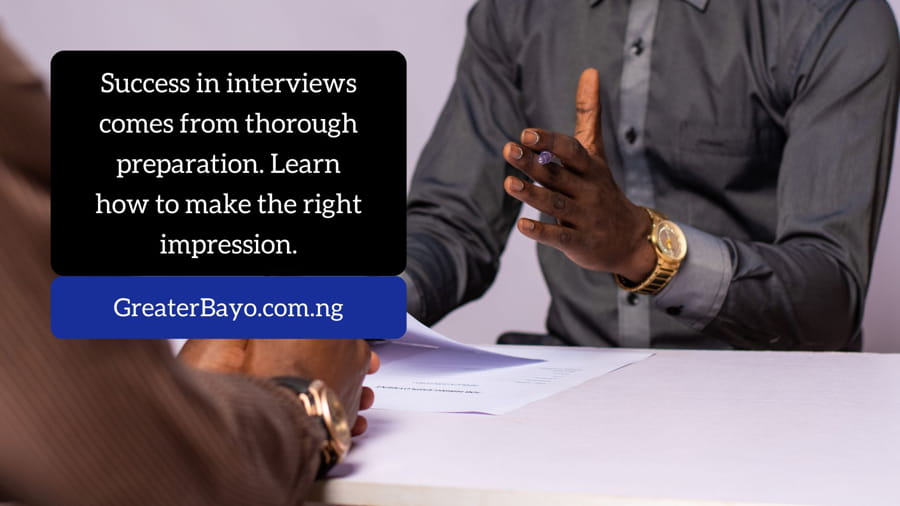The first thing you need to understand is that an interview is not an inquisition. It’s not a death sentence. It is a necessity if you’re looking for employment, changing roles or changing jobs. Here are some things to take note of if you want to stand out:
1. A great introduction
If I ask you to introduce yourself, I expect you to give me a great introduction that catches my attention. Your introduction is the first and possibly the best opportunity for you to sell yourself.
Most interviewers are either won or lost within the first 3 minutes (some say 30 seconds) of an interview. It is important that you make the best use of it.
First impressions open doors. Discover how to make yours unforgettable. Share on XYour introduction should be:
A. Catchy: You should choose your words carefully and deploy the best form of communication.
B. Brief: It mustn’t be verbose or boring. However, it should also not be too brief. If the interviewer asks you “is that all?”, you know you didn’t do a good job.
C. It must contain other significant information not necessarily found on your CV. Don’t regurgitate all you have on your CV. Your interviewer can see that already. Use the introduction to mention your skills and interests.
2. Confidence
You should be able to confidently discuss with me the contents of your CV or work experience.
Your level of confidence is revealed in:
A. The way you walk into the room. Let your habits be measured, heads up and shoulders straight.
B. The way you sit. Never slouch.
C. Your body language. Don’t fidget. Don’t swing your legs. And don’t crack your knuckles. Look me in the eyes. If you avoid my eyes, I feel there is something you’re hiding.
D. Your smile. The best way to show confidence is to smile. Wear a smile throughout the interview. A smile depicts that you’re a pleasant person.
E. The way you answer questions. Answer questions confidently. Eliminate poor mannerisms or speech breakers such as “ehm”, “is like”, “you know”, “as in”, etc.
F. Energy level. Don’t be a low-energy person.
Carry yourself with confidence. People believe in you when you show that you believe in yourself. Share on X3. Your CV
Your CV is who you are. It is more than a piece of paper. Most likely, the interviewer has gone through your CV before he/she meets you. He has formed an opinion already. The chat or interview will either reinforce that opinion or puncture holes in that opinion.
Your CV must be:
A. Well laid out in the right format and arranged to show your work experience with the most recent coming first.
B. Must have all relevant information about you. The essential contents of your CV are:
- Your contact information (full name, address, e-mail, phone number)
- Academic history
- Professional experience
- Qualifications and skills
- Awards and honours
- Publications and presentations
- Professional associations
- Certifications.
C. Must have no typographical errors. Use a spell checker.
D. Don’t lie on your CV. Your claims must be verifiable.
E. Know your own CV. You should be able to go through and explain your CV. Also, be able to defend what you have done.
4. Know about the company and the role you’re being interviewed for
I expect you to have done some research about the company and the role you’re being interviewed for. What you should know:
A. The company’s profile
B. Management profile
C. Their products or services
D. Key competitors and sector
E. Company aspirations/future plans
F. Demands of the role being interviewed for
G. Job description. Don’t attend an interview and then ask the interviewer what the role is about or the company does.
Researching the company shows you value the opportunity as much as the role. Share on X5. Communication Skills
How you communicate says a lot about you. The way you organize your thoughts and present them depicts a lot.
It’s not about oratory skill or a flowing prose (good if you have the ability). It’s about passing information across successfully. The interviewer must be able to understand what you’re saying. You must also be engaging.
Basic things to note in communication:
A. Answer questions directly.
B. Don’t use mono-syllablic (one-word) answers.
C. Listen attentively.
D. Don’t interrupt the interviewer.
E. Ask if you don’t understand a question.
F. Use a relevant story to pass across your point.
Communication consists of verbal and non-verbal communication. Non-verbal is your body language.
Part two will be published next week with the remaining five points.
Remember to subscribe to my YouTube channel. Also, find more practical tips and strategies in How to Stand Out and Get Hired, available at Roving Heights Bookstore and Amazon.
